Lab testimonials
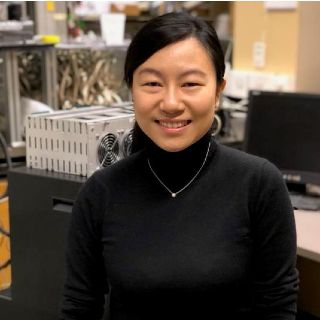 I’ve been working as a research engineer in the Focused Ultrasound Lab since 2013, after I completed my master’s degree in materials science and engineering. As a member of this world-leading research group, I have had the unique opportunity to witness the advancement of therapeutic ultrasound research and its potential in the treatment of diseases like brain tumours, essential tremor, depression and Alzheimer’s disease.
I’ve been working as a research engineer in the Focused Ultrasound Lab since 2013, after I completed my master’s degree in materials science and engineering. As a member of this world-leading research group, I have had the unique opportunity to witness the advancement of therapeutic ultrasound research and its potential in the treatment of diseases like brain tumours, essential tremor, depression and Alzheimer’s disease.
I’ve participated in several projects including transducer fabrication and characterization, construction of clinical prototyped hemispherical phased arrays for transcranial applications (e.g. blood-brain barrier opening and monitoring, super-resolution imaging and ultrasound-based skull registration) and the investigation of the feasibility of using an ultrasound-based resonance method for dynamic skull phase aberration correction and adaptive focusing during trans-skull treatment. These projects have exposed me to the full breadth of focused ultrasound research, from the basic and foundational, to the newest and most advanced topics in the field. There is also a high degree of collaboration with colleagues from various backgrounds due to the interdisciplinary nature of the projects, which has kept me learning new techniques.
—Lucy Deng, biomedical engineer
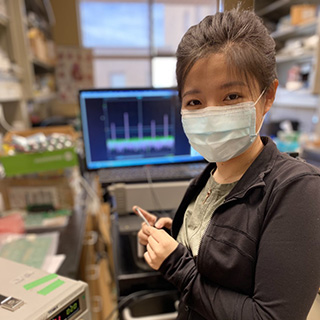 I joined the Focused Ultrasound Lab as a PhD student working under the supervision of Dr. Kullervo Hynynen in 2017. During the past years in the FUS lab, I was exposed to a wide array of theories and methodologies that served as important tools for studying complex and dynamic biophysical interactions between ultrasound and biological tissues. In particular, ultrasound in conjunction with clinically approved contrast agent can be used to transiently deliver agents into the brain without invasive surgery. To explore new clinical brain therapies, my research aims to develop small ultrasound devices to match small brain anatomical structures for preclinical research.
I joined the Focused Ultrasound Lab as a PhD student working under the supervision of Dr. Kullervo Hynynen in 2017. During the past years in the FUS lab, I was exposed to a wide array of theories and methodologies that served as important tools for studying complex and dynamic biophysical interactions between ultrasound and biological tissues. In particular, ultrasound in conjunction with clinically approved contrast agent can be used to transiently deliver agents into the brain without invasive surgery. To explore new clinical brain therapies, my research aims to develop small ultrasound devices to match small brain anatomical structures for preclinical research.
The Focused Ultrasound Lab is a great place to foster interdisciplinary research. My research project would not have come this far without this team consisting of experts coming from areas of biology to engineering. The amount of guidance that I have received from professors, staff, and other students is unlike anything I have experienced elsewhere. I am both glad and overwhelmed to be working in this lab to develop the next generation of therapeutic devices!
—Yi Lin, PhD candidate
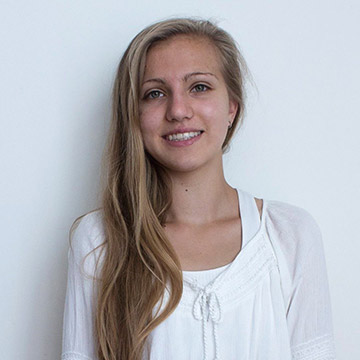 Interning at Sunnybrook's focused ultrasound lab was really life-changing for me. I got hands-on experience in research, and really saw how the world of research works—from lab meetings, to experiments, to taking notes, to learning from others and more. This experience refined many of my science and math skills, as well as my professionalism, time management, teamwork and many other skills. The lab community is so welcoming and friendly. All of my supervisors and co-supervisors were amazing and patient, despite my entering with only a fraction of the knowledge they have. The other students were brilliant and inspiring, and I am so happy to have met them. I was amazed at how Dr. Kullervo Hynynen and the lab manager, Kristina Mikloska, manage to keep things running, yet care about us interns as well. While this is a huge commitment, it will stick with one forever and is so valuable. I am currently studying at the University of British Columbia, something I never thought would happen. I hope to continue in the STEM fields in the future and will never forget my summers at the focused ultrasound lab.
Interning at Sunnybrook's focused ultrasound lab was really life-changing for me. I got hands-on experience in research, and really saw how the world of research works—from lab meetings, to experiments, to taking notes, to learning from others and more. This experience refined many of my science and math skills, as well as my professionalism, time management, teamwork and many other skills. The lab community is so welcoming and friendly. All of my supervisors and co-supervisors were amazing and patient, despite my entering with only a fraction of the knowledge they have. The other students were brilliant and inspiring, and I am so happy to have met them. I was amazed at how Dr. Kullervo Hynynen and the lab manager, Kristina Mikloska, manage to keep things running, yet care about us interns as well. While this is a huge commitment, it will stick with one forever and is so valuable. I am currently studying at the University of British Columbia, something I never thought would happen. I hope to continue in the STEM fields in the future and will never forget my summers at the focused ultrasound lab.
— Elektra Lindquist-Dakogiannis
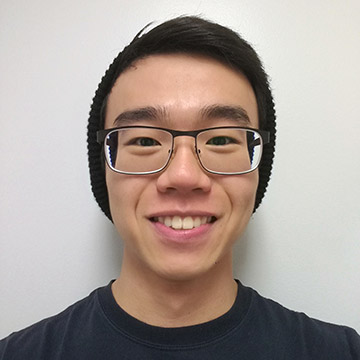 After two summers working with the focused ultrasound lab, I feel that my experiences have better prepared me for the workplace and have influenced my serious consideration of a career in research over industry. I worked on software development during both terms, contributing to one of the major projects in the lab involving acoustic confirmation of blood-brain barrier opening. From my first day to my last, the work continually challenged me and provided invaluable learning opportunities to build technical and interpersonal skills. Furthermore, seminars offered to our student cohort exposed me to Sunnybrook Research Institute’s cutting-edge advances in medicine every week. The research environment and hands-on experience offered by the focused ultrasound lab is unparalleled by any summer high-school research programs, and I hope it continues to impact aspiring students across the Greater Toronto Area.
After two summers working with the focused ultrasound lab, I feel that my experiences have better prepared me for the workplace and have influenced my serious consideration of a career in research over industry. I worked on software development during both terms, contributing to one of the major projects in the lab involving acoustic confirmation of blood-brain barrier opening. From my first day to my last, the work continually challenged me and provided invaluable learning opportunities to build technical and interpersonal skills. Furthermore, seminars offered to our student cohort exposed me to Sunnybrook Research Institute’s cutting-edge advances in medicine every week. The research environment and hands-on experience offered by the focused ultrasound lab is unparalleled by any summer high-school research programs, and I hope it continues to impact aspiring students across the Greater Toronto Area.
— Simon Liu
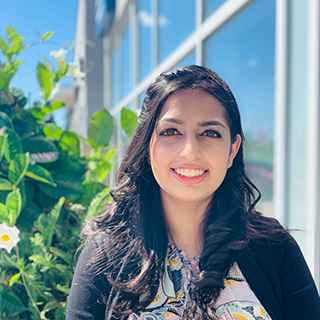 Research in the Focused Ultrasound Lab has been the most valuable experience for me, and I was fortunate enough to gain it during the COVID-19 pandemic. The humbleness, integrity, and selflessness the lab exemplified made the work environment welcoming and friendly. Throughout my journey in the lab, I worked with my supervisor to investigate the use of MRI-guided focused ultrasound for the treatment of Parkinson’s disease. Researching more about the technology was a continuous assignment. Every day I learned more about the project and gained practical skills such as data analysis and microscopic work. Both my supervisor and Kristina Mikloska (lab manager) guided me to reach my pinnacle and were understanding of my struggles. I can say without a doubt that my summer with the lab was the best thing that happened to me. I could go on about the tours, meetings, and connections I’ve made, but I’ll leave that for the future interns to experience. I lived every day to my fullest at Sunnybrook, and hope future interns will share the same sentiment. Without a doubt, Dr. Hynynen’s lab will continue building the future of tomorrow, and a pandemic won’t stop them from doing so.
Research in the Focused Ultrasound Lab has been the most valuable experience for me, and I was fortunate enough to gain it during the COVID-19 pandemic. The humbleness, integrity, and selflessness the lab exemplified made the work environment welcoming and friendly. Throughout my journey in the lab, I worked with my supervisor to investigate the use of MRI-guided focused ultrasound for the treatment of Parkinson’s disease. Researching more about the technology was a continuous assignment. Every day I learned more about the project and gained practical skills such as data analysis and microscopic work. Both my supervisor and Kristina Mikloska (lab manager) guided me to reach my pinnacle and were understanding of my struggles. I can say without a doubt that my summer with the lab was the best thing that happened to me. I could go on about the tours, meetings, and connections I’ve made, but I’ll leave that for the future interns to experience. I lived every day to my fullest at Sunnybrook, and hope future interns will share the same sentiment. Without a doubt, Dr. Hynynen’s lab will continue building the future of tomorrow, and a pandemic won’t stop them from doing so.
—Aisha Mir, high school intern
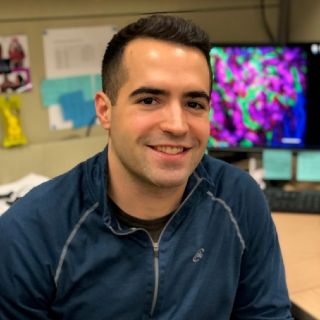 Studying under the guidance of Drs. Kullervo Hynynen, David Goertz and Meaghan O’Reilly has opened my eyes to the tremendous therapeutic potential of focused ultrasound and it is truly amazing.
Studying under the guidance of Drs. Kullervo Hynynen, David Goertz and Meaghan O’Reilly has opened my eyes to the tremendous therapeutic potential of focused ultrasound and it is truly amazing.
Without the need for surgery or anesthesia, ultrasound energy can be focused deep inside the body and can elevate the temperature of diseased tissues high enough to permanently destroy malfunctioning cells.
Alternatively, through harmless mild temperature elevations, the local delivery of chemotherapy from temperature-sensitive drug carriers can be achieved in tumours. My own PhD research has investigated the potential of this mode of therapy to improve chemotherapy treatments while reducing their harmful side effects.
Indeed, it is a very exciting time to be working in the field of therapeutic focused ultrasound.
At Sunnybrook, I am incredibly fortunate to work everyday with such thoughtful experts who are excellent mentors for aspiring researchers, and who are currently evaluating their therapeutic focused ultrasound treatments in clinical trials right here in the hospital.
There’s truly no place I’d rather be doing my PhD!
—Marc Santos, recently graduated PhD student
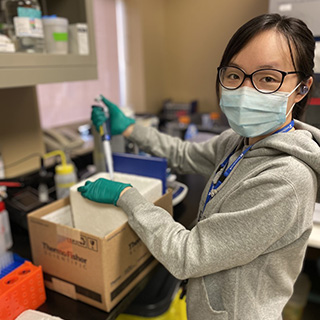 Taking the leap to commit to a Ph.D. comes with much uncertainty, self-doubt, and pressure. The Focused Ultrasound Lab was able to convince me to take that leap because I can see the immense therapeutic potential and inspiring rates of translation from the benchtop to clinical trials.
Taking the leap to commit to a Ph.D. comes with much uncertainty, self-doubt, and pressure. The Focused Ultrasound Lab was able to convince me to take that leap because I can see the immense therapeutic potential and inspiring rates of translation from the benchtop to clinical trials.
Focused ultrasound exploits the thermal and mechanical effects that arise from focused sound energy, and can be used to transiently open the blood brain barrier, treat essential tremor, uterine fibroids, solid malignant tumours, and more. My own research focuses on drug delivery systems that can be activated by focused ultrasound to release drugs in a controlled and localized manner in therapeutically significant quantities.
The Focused Ultrasound Lab is also an extremely welcoming workplace where I have found many mentors and know I can safely come forward with my struggles and find support. I am extremely grateful for the supervision of Dr. Kullervo Hynynen, Dr. Meaghan O’Reilly, and Dr. Harriet Lea-Banks and many others in the lab. The wealth of knowledge from various lab members of different backgrounds is an asset that I rely on whenever I run into challenges in my project.
—Ginni Ting, PhD candidate


